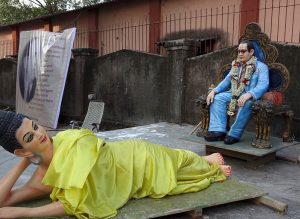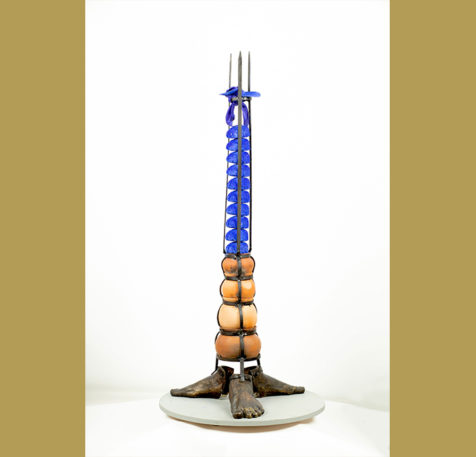CFP Global Humanities Institute 2023 Global Racisms, Cold War Humanism, and the Imagination of Just Futures
Call for Early Career Participants
Global Humanities Institute 2023
Global Racisms, Cold War Humanism, and the Imagination of Just Futures
DATES: December 10-22, 2023
VENUE: Centre for the Study of Developing Societies, New Delhi (INDIA) with limited option for Hyflex
Early career scholars and advanced graduate students are invited to apply to join an international team of scholars committed to developing a research program and model for inclusive collaborative work around the theme of Global Racisms, Cold War Humanism, and the Imagination of Just Futures.
Global Racisms is a Global Humanities Institute (GHI) supported by the Consortium of Humanities Centers and Institutes (CHCI) with funding from the Andrew W. Mellon Foundation. CHCI is working to advance multiple forms of international, collaborative research designed to foster new knowledge and new networks; its members include humanities centers at colleges and universities, independent scholarly societies, research libraries, and other institutes of advanced study. CHCI launched the first Global Humanities Institute in 2017.
Our CHCI / Mellon Global Humanities Institute, Global Racisms, Cold War Humanism, and the Imagination of Just Futures, is a partnership involving four universities: Institute for Comparative Literature and Society at Columbia University in the City of New York (USA); the Centre for Humanities Research at the University of the Western Cape (South Africa); Centre for the Study of Developing Societies (Delhi), and Tsinghua Institute of Advanced Study, Tsinghua University (Beijing).
The overarching goal of this Global Humanities Institute is to draw on the strong transnational resonance of the Black Lives Matter movement and the compelling responses of global communities across distinct demographics and colonial histories to reflect more broadly on the global reach and relevance of humanistic scholarship on the study of subaltern pasts. We draw on the current conjuncture to develop critical studies of race and racism that extend beyond the historical experience of the North Atlantic, and North America in particular. Our focus on philosophies of difference would link scholarship that tends to privilege the racial politics of post-emancipation societies of the New World, on the one hand, with concerns with postcolonial sovereignty and the politics of culture in the aftermath of European imperialism across “Asia” and “Africa” on the other. To do so, we adopt Cold War humanism as a mode of historicization alert to the constitutive contradiction between race/racism and ideas of “the human” as the organizing rubric of modern global thought and imperial governance. Our inquiry will be organized according to three strands: Thought Worlds, with a focus on the relationship between worldmaking and concept-formation; Redress and Reparations, which asks how states and communities have approached the problem of righting (historic) wrongs; and attention to questions of Aesthetics and Politics as these enable projects of public activism and engagement by focusing on the poetic, the experimental, and the fragmentary as generative sites of insurgent thought essential to remaking everyday life. Early career scholars whose research fit into one or more of the themes are invited to submit an application.
An interdisciplinary group of participants will develop and share research concerning how ideas of universalism and social justice might be imagined against the backdrop of imperial and post-imperial pasts; consider questions about the ethics and politics of the archive in relation to projects of historical redress and reparation; and explore utopian and imaginative visions of sociability and radical care as a way to think past ongoing structures of dehumanization.
From December 10-22, 2023, investigative teams from the four partnering universities will gather in New Delhi, India for a twelve-day Institute addressing Global Racisms, Cold War Humanism, and the Imagination of Just Futures. Sessions will address the theme of the Institute using a broad range of perspectives and methodologies. The Institute will consist of plenary lectures, workshops, site visits, and artistic events. Early career scholars will receive mentoring from senior scholars. The working language for the Institute will primarily be English.
We invite applications from Early Career Scholars based in a range of humanities disciplines including, but not limited to, environmental humanities, anthropology, audio-visual arts, creative and performing arts, cultural studies, digital humanities, Indigenous and ethnic studies, film studies, gender studies, geography, health humanities, history, law, literature, peace studies, philosophy, and religious studies.
We hope to inspire a global network of early-career researchers invested in the theme of the institute who will then remain in communication and collaborate with each other into the future. We are committed to assembling a diverse and inclusive community. To that end, we especially encourage applications from members of underrepresented groups and the Global South.
Application Requirements: An applicant must be either an advanced graduate student (in or near candidacy) or within ten years of receiving a Ph.D. (and, if working at a university with a tenure system, non-tenured). The competition is open to anyone from anywhere in the world whose universities are affiliated with CHCI. Direct affiliation with a Center is not necessary, only affiliation with the home institution housing a Center is required.
(Please note: Interested scholars from universities not currently affiliated with CHCI are encouraged to inquire into possibilities of institutional affiliation.)
Successful applicants will have their travel to, accommodation, and food at the Institute fully funded, with the expectation that they will participate actively in the Institute, with arrival and departure slated for December 9 and Dec 23 respectively.
Applicants must commit to engage in and contribute to every aspect of the Institute, attending all sessions throughout the entire Institute. Participants who are not able to travel to India will be expected to participate in all activities that are accessible virtually and will receive a modest per diem.
Applications have three components: (1) a statement of no more than a thousand (1000) words that demonstrates a sustained interest in the themes of the Institute; (2) a CV of no more than three pages; and (3) either a brief travel budget so that we can estimate aggregate cost or a statement that expresses a preference for virtual participation.
Applications will be reviewed on a rolling basis and should be submitted as soon as possible. The deadline for submissions is June 1, 2023.
Applications should be submitted to Dr. Anupama Rao, Director, Institute for Comparative Literature and Society. Please put “Global Racisms GHI 2023 Application” in the subject line of your email and send it to icls@columbia.edu. Questions may be submitted to the same email address. Please use the same subject header, preceded by “Query About” when you do.










